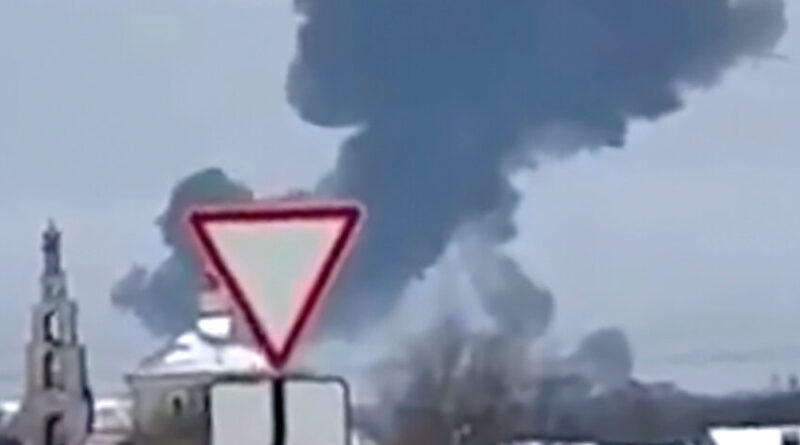Thursday Briefing
[ad_1]
Dozens killed in military plane crash
A large Russian military transport plane crashed yesterday near the border with Ukraine, killing the 65 Ukrainian prisoners of war, six crew members and three other people on board, the Russian Defense Ministry said, accusing Ukraine of shooting down the plane with missiles.
The ministry said that the prisoners of war were being transferred to the Belgorod region to be exchanged for Russian service personnel. It accused Ukrainian forces of launching two missiles from the nearby Kharkiv region of Ukraine that struck the aircraft. The Russian claims could not be independently verified.
Officials in Kyiv did not comment directly on Moscow’s accusations or claims, and the military’s general staff headquarters issued a statement asserting a right to target Russian military transport airplanes in the border region. But later in the day, Ukraine’s military intelligence agency hinted that the episode might have been a tragic mistake.
Analysis: If Ukraine did shoot down a plane with its own soldiers on board, even unwittingly, it would be a painful setback at a difficult time for its war effort, which is severely challenged by ammunition and personnel shortages and fears that Western support is eroding.
NATO: Prime Minister Viktor Orban of Hungary pledged to push legislators to vote for Sweden’s admittance into NATO. He offered no timeline. The Hungarian leader has repeatedly hampered Europe’s efforts to bolster security during Russia’s invasion of Ukraine and vetoed a $52 billion aid package for Kyiv.
An attack on a shelter for displaced people kills 9
Explosive projectiles hit a U.N. training center in southern Gaza yesterday, killing at least nine people, injuring 75 others and starting a blaze at a site where hundreds of people displaced by fighting had taken shelter, U.N. officials said. The death toll was expected to rise, according to U.N. officials in New York.
U.N. officials did not say explicitly who had fired on the shelter, but they said it had been hit by tank rounds; only Israel uses tanks in the conflict. The Israeli Defense Force later said in a statement that it was looking into the possibility that Hamas had hit the building and that it had “ruled out that this incident is a result of an aerial or artillery strike by the I.D.F.”
Details: The shells struck a building housing 800 people, part of a U.N. compound containing a number of buildings with about 30,000 displaced people, U.N. officials said.
The toll: Nearly 150 people working for nongovernmental organizations have been killed in the war, and 237 U.N. sites have been struck since Oct. 7, a U.N. spokesman, Stéphane Dujarric, said, adding that the parties to the conflict know the locations and details of all U.N. facilities.
In other news from the war:
-
Shipping costs are rising as Houthi attacks in the Red Sea force companies to pay high insurance premiums or take alternative routes that burn more fuel.
-
In Khan Younis, thousands of people were trapped at a hospital by heavy fighting. Israeli forces surrounded another hospital where displaced people were sheltering, aid agencies said, after Israel’s military ordered evacuations for that part of the city.
Measles cases rise in Europe
Measles, a disease preventable by vaccination, is resurgent in parts of Europe, including Britain. Small outbreaks have also popped up in several parts of the U.S.
In Europe, reported measles cases rose more than 40-fold last year compared with 2022, the W.H.O. said yesterday. Nearly a third of those cases were in Kazakhstan, which the W.H.O. considers as part of Europe and where the outbreak is attributed largely to children who missed routine immunizations. Experts fear the virus could spread beyond Kazakhstan.
THE LATEST NEWS
Around the World
City officials in San Francisco attempted to spend $1.7 million in state funds on a public bathroom. It’s still not done.
For many residents, the episode has illustrated the city’s inefficiencies. If an army of more than 30,000 city employees with a $14 billion annual budget cannot build a simple bathroom, what hope is there for solutions to a housing shortage and fentanyl crisis?
SPORTS NEWS
European soccer title races: Brace yourself for exciting season finishes.
Australian Open: Carlos Alcaraz is out after a four-set loss to Alexander Zverev in the quarterfinals.
PGA Tour’s new star: Nick Dunlap just needs your patience.
Reaching a saturation point: Does Formula 1 really need another street race?
ARTS AND IDEAS
The perfect cup of tea?
An American chemistry professor has a surprising thought about how to make the best cup of tea: Add a pinch of salt.
Michelle Francl looked at papers and texts covering more than 1,000 years to try to determine the best way to make a cuppa. She cautions that you should add salt first and foremost if the bag has been left too long in the water — and only the tiniest pinch. “The sodium blocks the bitter receptors,” she said. “The tea tastes smoother and less bitter.”
In Britain, that suggestion has caused something of a furor. “Good Morning Britain,” the ITV news program, said that adding salt to tea “feels like a crime.” The Daily Mail’s headline claimed that the suggestion had left “Brits at boiling point.”
Read more about her advice, conventional and otherwise.
RECOMMENDATIONS
[ad_2]
Source link



